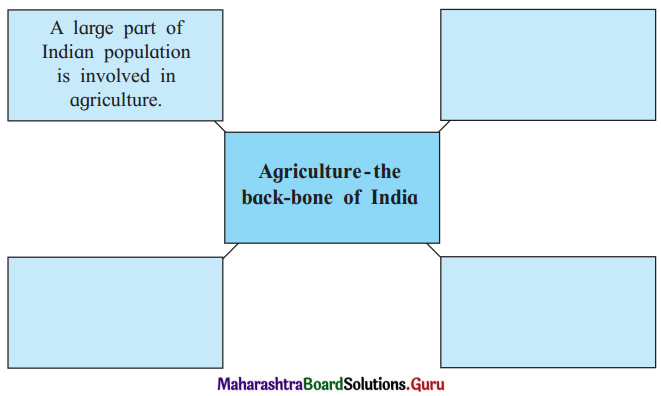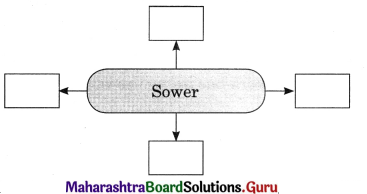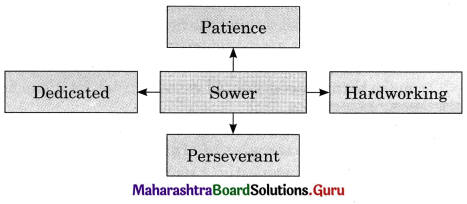Class 11 English Chapter 2.2 The Sower Question Answer Maharashtra Board
Balbharti Yuvakbharati English 11th Digest Chapter 2.2 The Sower Notes, Textbook Exercise Important Questions and Answers.
11th Std English Chapter 2.2 Brainstorming Question Answer
11th English Digest Chapter 2.2 The Sower Textbook Questions and Answers
Question (i)
Make a list of words related to agriculture.
Answer:
The words related to agriculture are:
(a) Irrigation
(b) Cultivation
(c) Crop
(d) Sow
(e) Farming
(f) Farmer
(g) Pestiside
(h) Fertilizer
(i) Seeds
(j) Hybrids
(k) Farm
(l) Manure
(m) Dairy
(n) Livestock
(o) Ploughing
(p) Harvest
(q) Plant
(r) Crop rotation
(s) Animal Husbandry
![]()
Question (ii)
Discuss the activities carried out by a farmer.
Answer:

Question (iii)
In our country engineering, teaching and medical fields are much sought after. Other professions, occupations though they make a significant contribution to the society, do not get their due.
Answer:
| A | B |
| (a) Farmer | (a) Highly unpredictable Economic Gains |
| (b) Conservancy workers | (b) Don’t get the respect for the service they provide |
| (c) Housemaids | (c) Lack of job security and in some cases respect |
| (d) Sportsmen | (d) Insecurity due to shorter duration of professional life |
| (e) Hawkers | (e) Uncertainty in business |
Question (iv)
‘Agriculture is the backbone of the Indian economy’. Fill in the boxes supporting this statement. Complete the following web diagram.

Answer:

![]()
(A1)
Question 1.
There are a number of challenges a farmer in India faces. Discuss with your friend, how it is possible to improve the condition of farmers.
Answer:
| Challenges | Solutions |
| 1. Water scarcity | Rain water harvesting |
| 2. Credit and Indebtedness | Arrangement for micro-loan from government sources/banks and not from the money-lenders. |
| 3. Land Issues | Clear title of lands for the farmers. |
| 4. Climatic Changes | Reduce greenhouse gas emission from farming practices. |
| 5. Social Groups | Sound public policy and support on long-term basis since group approach to farming is the need of the hour as average size of land-holding is going down. But a lot of training is/-030 needed to form a group of like-minded farmers. |
| 6. Lack of advanced technology | Creation of technology based crop advisory. |
| 7. Diversification | Creation of crop-specific technologies, identification development of market and provision of economic incentives. |
| 8. Market Risks | Market regulations provided by the government to ensure that the farmers receive the price they desire to get for the product. |
(A2)
Question 1.
The poet has observed the sower closely. Express in your own words the reverence the poet has for the sower.
Answer:
Victor Hugo like a typical romantic poet began the poem with a beautiful scene from nature describing the twilight. In the English translation, the poet Torulata Dutt also did so. But in the poem gradually nature took the backseat and the poet’s attention is occupied by the solitary farmer who was alone in the field well beyond the working hours to scatter the seeds all over the place. Initially, the poet did not think much about the old sower in torn clothes.
Poet after watching carefully, the serenity and devotion of the man could be noticed. His age and experience must have shown him many bad harvests, but he refused to give up. Moreover, he might not live long enough to see the fruit of his hard work but this did not bring down the level of his dedication. His confident steps made the poet feel even his dark shadows more dominating than the deep trenches around the field. Thus, he developed an intense respect for the sower.
![]()
(A3)
Question 1.
The poet is prompted to call the sower an ‘august personality” which means one who has reached the highest position in his work place. Explain this using the following points.
1. Hard work
2. Perseverance
3. Dedication
Answer:
In the eyes of the poet the old solitary sower appeared majestic and awe-inspiring because he could see the determination and dedication in his attitude. The working hours were over since it was getting dark in the evening. But he was ready to continue his job of scattering the grains all over the field, walking to and fro, at his age, with a expectation of a good yield of crop.
Like a devoted soldier he was marching on the field and the poet was impressed by his sincerity and confidence. He must have experienced many bad harvests , but his hard work, patience and desire to achieve success were not affected at all. He continued with his job without bothering about the starry skies, to the poet who developed a deep respect for the sower’s tenacity, positive attitude towards life and most importantly his commitment to his work.
(A4)
Question (i)
Pick out the examples of alliteration from the poem
Answer:
- “a sower lingers still” – sound of “s” is repeated.
- “Dominates the furrows deep” – sound of “d” is repeated.
- “Darkness deepens” – sound of “d” is repeated.
- “Seems to touch the starry skies” – Sound of “s” is repeated.
- “From his hands ” sound of “h” is repeated.
Question (ii)
‘Seems to touch the starry skies’. The poet has used word imagery. Describe the idea and pick out other similar examples from the poem.
Answer:
Word imageries create a visual representation of ideas or situations in the readers minds and helps the reader to create a mental picture with the help of words.
Word imageries in the poem:
(i) “Twilight hastens on the rule”
This line creates an image of a soft light in the sky just after the sunset. We can imagine the gradual fading of the bright sunlight and can only see the twilight, that is, semi-darkness.
(ii) “His Silhouette / Dominates the furrows deep”.
The image of the sower is created in the readers mind with this imagery. The sower’s black shadow gradually becomes bigger and the deep furrows around the field start appearing smaller. The idea to create such a mental picture is to present the longer than life image of the sower who can even dominate over the nature.
(iii) “Seems to touch the starry skies”
This picture depicts the transition from the twilight sky to the night sky. The poet wants to express his reverence for the majestic quality of the sower. To him the image of the sower gradually grows to reach the top of the sky as if the entire world is glowing wit his reflection and the twinkling stars are the grains he has spread all over the place.
![]()
(A5)
Question (i)
Write an appreciation of the poem considering the following points:
- About the poem / poet / title.
- Theme
- Poetic devices, language, style
- Special features / novelties / focussing elements
- Values, message
- Your opinion about the poem
Answer:
The poem ‘The Sower’ is translated by the Bengali poet Torulata Dutt from the French poet Victor Hugo’s French poem ‘Saison des Semailles : Le Soir.’ The French name literally means in English, ‘Sowing Season’: In the evening “where the poet talks about a sower and his attitude towards his job.
The poet was leisurely spending time in a porchway enjoying the beauty of the twilight sky which dominated the day because it was the time between the day and the approaching night. Suddenly a lone sower caught his attention since the working hours were over and there was no one else in the field. The towering black shadow of the man was so majestic that it even appeared bigger than the deep trenches around the field.
The man was absolutely engrossed in spreading the grains all over the ground. His confident steps and dedication towards his work even in fading light impressed the poet. He developed a deep respect for the sower and appreciated his larger than life appearance.
The theme of the poem is to show the powerful human aspects which could even dominate the nature. The attitude and sincerity of the sower made him appear to the poet so impressive that he put him in a high pedestal of searching the ‘starry skies’. The poet Tarulata Dutt has used a simple rhyme scheme “abab” The word imageries, like the domination of the twilight over the sunlight, the majestic shadow of the sower growing bigger than even the deep trenches around the field and the poet’s imagination of putting the sower at a great height of touching the sky with his grains representing the twinkling stars enhance the beauty of the poem.
They bring out the poet’s love for the nature placing it side by side with humanistic features. The focus of the poem is basically on the sower but nature has been included right from the beginning to the end very elegantly b the poet giving a novelty to the poem.
The poem has a strong message of selflessness of the old sower who is doing his job diligently without even bothering to know the result. His age and experience must have given a lot of experience on farming which has taught him not to give up even if it is a bad harvest. He is sincerely doing his job even after the working hours.
We, the readers, get the message from the sower that we need to do our job with dedication and hard work will definitely pay. The poem appeals to me because of the impressive presentation of the sower and the unusual comparison between human features with nature. Both nature and human aspects play dominant roles making the poem interesting.
Question (ii)
Write a summary of the poem using the following points:
- Title
- Introductory paragraph (about the poem, type, nature, tone)
- Main body (central idea, gist of the poem)
- Conclusion (opinion, views, appeal)
Answer:
Refer Synopsis
Question (iii)
Compose a poem on a farmers in 4 to 6 lines in continuation of the following.
Answer:
He sweats throughout the dav.
He does not fret, he believes his hard work will nav.
He sows seeds expecting a good harvest.
To the soil he bows for encouragement to invest.
![]()
(A6)
Question 1.
Imagine that you are a farmer from a drought prone area. Write a letter to a newspaper editor, discuss the problems and suggest possible solutions.
Satya Vase,
Aurangabad,
27-07-2019
The Editor,
The Times of India,
Dr. D.N.Marg,
Mumbai – 400001
Subject: Problems of a drought-prone area like Aurangabad
Respected Sir,
I am Satya Vase, a farmer from Aurangabad, a drought-prone area. I want to bring to your notice certain problems which,we the farmers in our area are facing due to drought.
It is a known fact that Aurangabad has been going through severe water crises and it affects the farmers badly. But, today I want to concentrate on two important factors which is bothering the farmers for quite some time. All our appeals have fallen into deaf ears.
In Aurangabad, the obsession with borewell among the farmers is increasing to a dangerous level during every drought and this is very high among the farmers cultivating sugarcane. The sugarcane farming has become so popular because it is a low investment crop which comes with a price guarantee.
Sugarcane farmers are well aware of the fact that sugarcane farming consumes a large quantity of irrigation water. We, the poor farmers cannot afford to install borwells because of high cost and even the result is disastrous for us. A number of representations to the government have not solved our problems. Our sufferings have reached the greatest height. People are migrating to bigger cities and there also are leading a miserable life.
Through your esteemed daily, I want to they draw the attention of the government to take an early action. We request the government to send a crisis management group to come to Aurangabad and set a separate Drought Monitoring Centre report to the Drought Management Authorities to arrange for immediate supply of water. Urgent adaptation of strategies and their quick implementation are what we are requesting for.
Thanking You,
Yours Sincerely,
Shyam Vase.
(A7) Project:
Question 1.
Visit your college library or use the web and collect information on ‘Green Revolution’ and ‘white Revolution’ in our country.
Yuvakbharati English 11th Digest Chapter 2.2 The Sower Additional Important Questions and Answers
Question 1.
Explain in your own words: “Twilight hastens on to rule”
Answer:
The poet is referring to a time when the day is going to be over and night will fall. So,it appears to the poet as if the twilight is quickly overlapping the sunlight. Twilight is the time just before it becomes completely dark in the evening and the poet imagines it to be in a hurry to wipe out the brightness of the sunlight.
![]()
Question 2.
The word ‘Marches’ suggests –
Answer:
The poet expresses the appreciation for the sower by using the word ‘marches’ instead of simply referring his movement as ‘walks’. The sower is confident and dedicated to his job. So he marches with determination of a good harvest as a soldier marches with the positive attitude of winning the battle.
Comprehension
Global Understanding:
Question 1.
Complete the web that brings out the qualities of the sower.

Answer:

Inference / Interpretative / Analysis:
Question 1.
Explain the Poet’s feeling as he watches the sower.
Answer:
The poet is thrilled to see the solitary sower continuing with his work sincerely even after the working hours are over. His hard work of spreading the grains all over the ground, in confident steps, impresses the poet. He feels the sower’s presence is majestic and awe-inspiring.
![]()
Question 2.
The grains are referred to as ‘precious” – Give reasons.
Answer:
For a farmer, grains are always ‘precious’ as they are symbols of prosperity and bright future. His survival depends on the quality of harvest and good quality of grains is needed for that. He is protective about each and every grain and gives its due respect.
Personal Response:
Question 1.
What do you learn from the sower? Justify your answer.
Answer:
The sower has taught me to have dedication and devotion for my work without bothering about the outcome. His efforts of spreading the seeds even after the working hours has impressed me and I have learnt not to grumble about the extended time at work place, if my work demands it. Last but not the least, the sower has shown that outward appearance does not matter. A person’s attitude can raise his/ her stature to great height.
Poetic Device:
Question 1.
Find out the rhyme-scheme and pick up the rhyming words from the lines quoted to you.
Answer:
The rhyme-scheme is abab
The rhyming words are lands- stands, still-thrill, silhouette-set, deep-reap, plain-grain, wide-stride, light- height, eyes-skies.
![]()
Creativity:
Question 1.
Compare a poem of four lines to express your appreciations for your mother. Use a proper rhyme-scheme.
Answer:
- My mother is my first teacher.
- Never does she try to be a preacher.
- Her words are catalysts, quickly I respond,
- strong and thick is our love bond.
Appreciation:
Question 1.
Write an appreciation of the extract with the help of the following points: (100 -150 words)
- About the extract
- Theme and significance
- Poetic style, language, poetic devices
- Inspirational message
- Your opinion and critical evaluation of the extract
Answer:
The extract shows how the impression of the poet about the sower changes as he observes the activity of the solitary sower working on the farm, well-after the working hour gets over. Initially the poet does not give much importance to the sower. But as he pays attention to him, he is able to find out his dedication, sincerity and perseverance of the man who deserves respect.
The poem is a translation from a French poem by Victor Hugo. The Bengali poet, Tarulata Dutt uses simple rhyme-scheme abab but the word imageries like the majestic shadow of the sower growing bigger than even the deep trenches around the field, the poet’s imagination of putting the sower at a great height of touching the sky with his grains representing the twinkling stars are beautiful.
The poem has a strong message which shows how a person’s dedication can draw the attention of others and make them respect him. I love the extract as it teaches me that hard work has its own reward.
![]()
Poetic devices:
Question 1.
Other poetic devices
Answer:
Personification
- “Twilight hastens on to rule”- ‘Twilight’ is personified.
- “Shadows run across the lands” – ‘Shadows’ are personified.
- “Sunlight I see, dying fast” – ‘Sunlight’ is personified.
Inversion:
(i) “Old, in rags, he patient stands.”
The order of the words are changed for poetic effect.
(ii) “Now to sow the task is set”
The order of the words are changed for poetic effect.
(iii) “Soon shall come a time to reap”
The order of the words are changed for poetic effect.
(iv) “Marches he along the plain”
The order of the words are changed for poetic effect.
(v) “Scatters wide/From his hands the precious grains.”
The order of the words are changed for poetic effect.
(vi) “Now his gestures to mine eyes/Are august,…”
The order of the words are changed for poetic effect.
Yuvakbharati English 11th Textbook Answers Solutions Section 2 (Poetry)